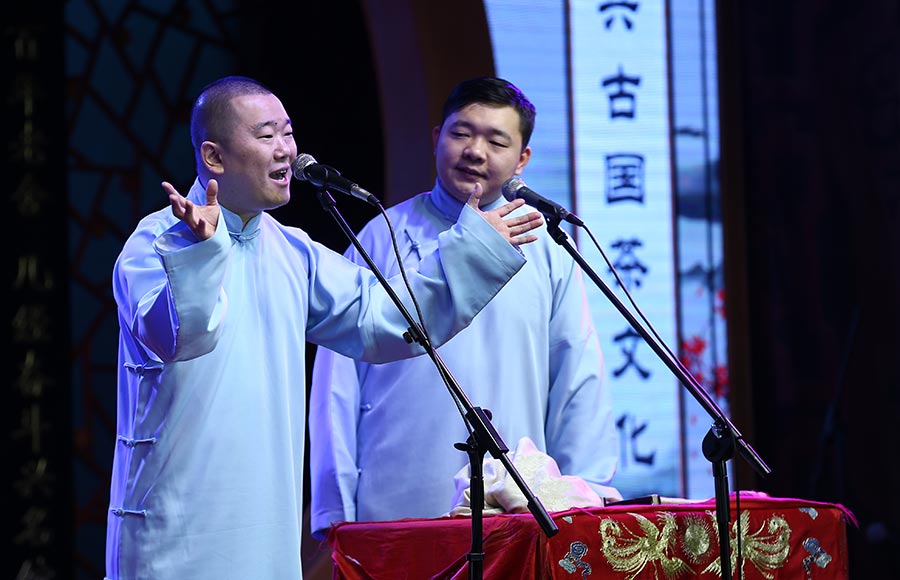When Cao Yunjin walks into a room on the third floor of Laoshe Teahouse, a popular site for showcasing traditional local arts of Beijing, his sunglasses, chic haircut and sharp suit are in stark contrast with his surroundings, which feature old photos, traditional Chinese furniture and ink paintings.
The 32-year-old Cao is a comedian, who is known for practicing the traditional Chinese art form, called xiangsheng, or cross-talk.
At the same time, more than 200 people are gathering in the small theater downstairs waiting for a show by the comedians from the Tingyunxuan troupe to start. Cao is the last performer.
At 3 pm, the show starts. While munching on sunflower seeds and sipping tea, the audience laugh and cheer at the performance.
When Cao, along with his longtime partner Liu Yuntian, appears onstage in traditional long robes, which xiangsheng actors wear, the crowds burst into applause and some even call out to Cao.
Tingyunxuan is a troupe Cao founded in 2010.
The troupe, comprising more than 20 actors, and whose name mean "listening to Cao", gives shows on weekends at two small venues in the capital's downtown.
The troupe is so popular that 2,000 tickets for one of its shows sold out in one minute online in 2010, a record for xiangsheng performances, says Wang Jingjing, the manager of the troupe.
Cao was so completely occupied with starring in films and taking part in TV shows that he didn't have time for a single xiangsheng performance in 2017. So, the recent show at the Laoshe Teahouse is Cao's first xiangsheng performance of 2018.
On Jan 28, he will do a show at the Poly Theater in Beijing along with performers from Tingyunxuan.
Asked why he has cut back on his xiangsheng performances, Cao says: "I've spent 15 years making a name for myself as a xiangsheng actor. Now, I want to use the next 15 years to let people forget about my identity as a xiangsheng performer.
"I don't want to narrow my scope as an actor. Xiangsheng is just one aspect of my career, and I want to move on."
Xiangsheng, a comedy form that originated in Beijing in the Qing Dynasty (1644-1911) as a street art, usually involves two performers onstage.
The shows typically comprise witty talk, jokes and creative puns, and deal with topics like daily events, family life and social issues.
Speaking about the art form, Zhao Yun, a 30-year-old Beijing native, who joined Tingyunxuan in 2012 after standing out from about 150 candidates, says: "Traditional Chinese art forms, like xiangsheng, are among my favorites. Since becoming a xiangsheng actor, I enjoy the instant feedback given by the audience.
"Cao Yunjin was among the judges when I auditioned. He was already a star then. It was the first time I met him and I was very excited."
Cao, who is one of the most popular xiangsheng actors in the country, has a large fan base thanks to his solid technique and performing style. He has nearly 3 million fans on his Sina Weibo account.
The actor, who was born in Tianjin, was raised mostly by his mother-who now lives with him in Beijing-as his father, who was an engineer, died when Cao was 13 years old.
 |
|
Cross-talk actor Cao Yunjin and fellow performers from the Tingyunxuan troupe, all clad in long robes, put on traditional xiangsheng performances with an added youthful twist at the Laoshe Teahouse in Beijing on Jan 21. |
Cao was introduced to xiangsheng by a Tianjin-based artist Tian Lihe in 2001. In 2002, Cao started learning the art from cross-talk actor Guo Degang, who is credited with "popularizing the old art form among young audiences".
Speaking about his early days, Cao says: "I grew up in Tianjin, which was the city where xiangsheng became prosperous. And I like imitating masters such as Ma Sanli and Hou Baolin."
Typically, apprenticeships are at the core of training young xiangsheng actors, with the master passing down his techniques.
So, the apprentice usually lives in the master's house to learn the skills before he can perform and make a living on his own.
When Cao was an apprentice he used to wake up at 5 am to do voice practice, followed by reading and reciting traditional xiangsheng pieces, until midnight.
Besides, he also learned Peking Opera as lots of xiangsheng pieces involve Peking Opera stories and singing.
In 2006, Cao made his stage debut in Beijing, and became an instant success. Then, in 2010, he left Deyunshe-Guo's troupe-and launched his own troupe besides moving into other fields.
Speaking about that period in his life, he says: "I can still recall that I gave four shows a day for a whole year only taking a break once a week. Those acting experiences are valuable memories and treasures. I really miss those days."
Meanwhile, he admits that like many other traditional art forms, xiangsheng is facing decline. One of the main problems, he says, is the lack of original works.
"Xiangsheng and rock music are similar as both are about expressing attitude and talking about social problems. It's really hard to write a piece which can be called a classic. It takes time, sharp observation and solitude," he says.
If you go
7:30 pm, Jan 28. Poly Theater, 14 Dongzhimen Nandajie, Dongcheng district, Beijing. 400-600-4100.

Presented by Chinadaily.com.cn Registration Number: 10023870-7
Copyright © Ministry of Culture, P.R.China. All rights reserved